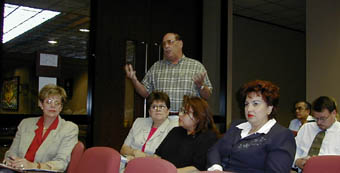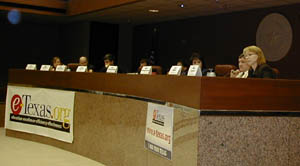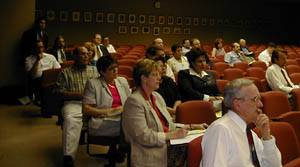| Local Government Empowerment Task Force
El Paso, May 16, 2000
Comptroller's Office Hears Local Government Concerns in El Paso
Summary
When county and city governments combine their efforts, they can build community networks and provide better service to their constituents, according to testimony heard at the May 16 e-Texas Local Government Empowerment Task Force public hearing in El Paso.
"County and city governments need to work together for the community," said Telecommunity Resource Center Executive Director Gene Crick of Austin. "Community leaders should work at closing the gap between government and people."

The hearing was part of Texas State Comptroller Carole Keeton Rylander's e-Texas initiative, which is charged with developing recommendations to help Texas state government meet the challenges of the Internet Age.
Major Issues
Major issues discussed by panelists include:
-
Empowering local governments with community networks,
-
The Comptroller's office assisting local governments with the new accounting system, and
-
Recognizing and closing the digital divide gap.
Panelists' Commentary
"You can't further polarize the people," Crick said. "City and county governments must work together with Rotary clubs, Chambers of Commerce and library boards to help bring the people of a community closer to the leaders."
He said state government is a tool for the communities with its information resources and funding.

Cynthia Villa, associate vice-president for Finance and Administration at the University of Texas-El Paso, agrees that the Texas State Comptroller's office can help empower local government.
"Local governments will have to comply with the Government Accounting Standards Board (GASB), and in doing so will need help," Villa said. "The Comptroller's office should take the leadership and develop statewide implementation guidelines for the local governments."
GASB develops generally accepted accounting principles for governments (state and local), including financial reporting. Governments that comply with these standards receive an unqualified opinion from independent auditors which is necessary to qualify for federal/state grant funding, as well as, to receive a favorable bond rating, needed to issue bonds. Failing to comply with the GASB standards, a government would receive simply a qualified opinion from their independent auditors who would disqualify the government from several major funding sources.
GASB 34 and 35 will add a new layer to governmental accounting/financial statements that will allow a government to start reporting the costs of providing government services and how these costs are funded. Basically, governments will be required to show the value and the depreciation of their infrastructure.

Additionally, Villa said that the state should supply technical resources to assist local governments and school districts that may not have the internal resources or expertise to meet the GASB implementation deadlines.
William Chapman, director of the office of budget and management for the City of El Paso, has reservations regarding GASB. He said there is an overwhelming cost to local government in implementing the system. He said some local governments do not have the funds or the personnel to meet the requirements.
Labor issues also contribute to the digital divide, according to Becky Lentz, policy analyst for the Texas Department of Information Resources in Austin.
"The digital divide is more of a labor issue," Lentz said. "The workforce is lacking in training and trained workers for the digital economy."
Additionally, she said, some constraints to local government include the life span of computers compared to the costs. As technology changes, the life span of a computer decreases and keeping up with the new technology adds cost.
Other digital divide factors include economic barriers, time constraints and opting out of using the computer.
Lentz said some people opt out of using computers because they can't navigate well, don't like to read and scroll, or don't have time. They would rather watch television or read a newspaper. She said when some families are working two jobs just to make ends meet, taking time to sit and "surf the Web" is not a priority. And as people struggle for economic independence, the purchase of a computer is not feasible.
El Paso County Judge Dolores Briones said she recognizes a large gap, or digital divide. She is concerned with the population of Spanish-speaking Texans who are beginning to learn the basics of English, and who will not be able to effectively understand computers and technology.
Additionally, she said that the digital divide is a result of a lack of exposure to the Internet and computers by the older generation. Children and young adults use the computer and Internet the most, leaving the older generations behind, she said. In Spanish-speaking families where the parents and grandparents are learning English from their children, the children do not take the time to also teach them about computers.
Public Commentary
Most audience members agreed with Judge Briones regarding the digital divide in the El Paso region. They encouraged the state to send more money to the region for computer training and computer access in the libraries.
One audience member suggested lending state personnel to the El Paso region to help install computers and Internet modems in the libraries.
| 
